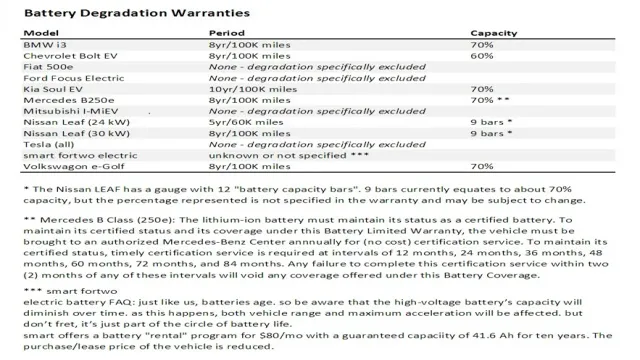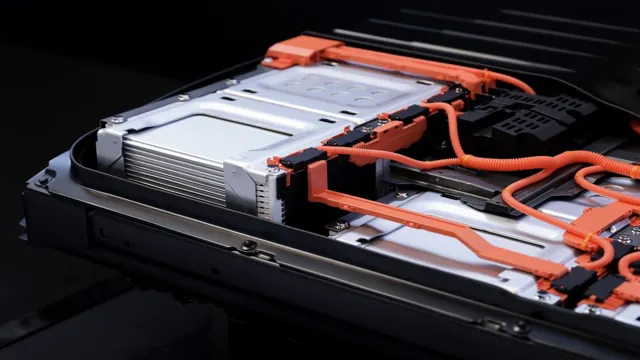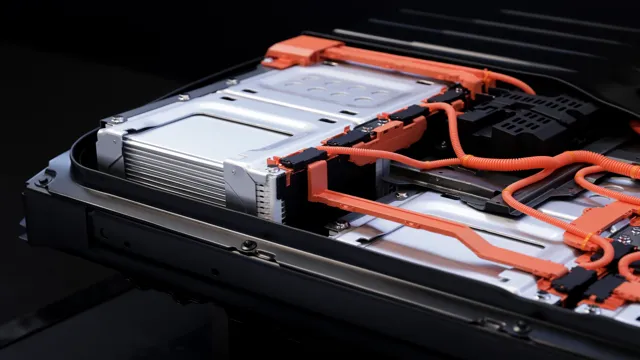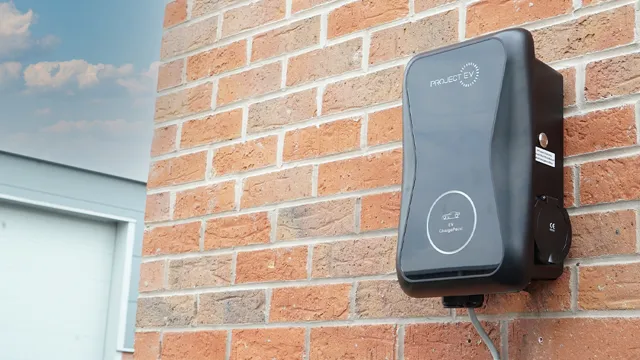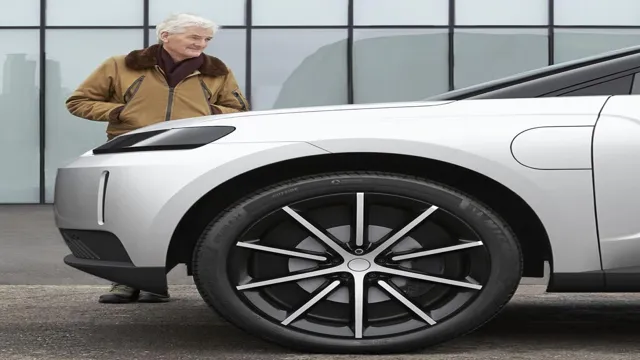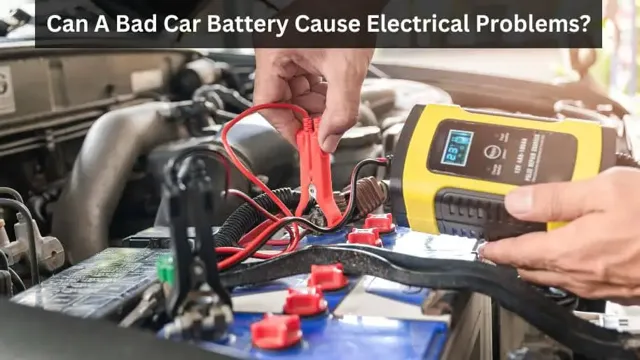Power Up Your Ride: Everything You Need to Know About Electric Car Battery Warranty
If you are considering buying an electric car, then you might be wondering about the battery warranty. After all, this is one of the most crucial components of an electric car. The battery’s range will largely determine how far you can drive before needing to recharge, and it is also one of the most expensive parts to replace.
So, how long does an electric car battery warranty last, and what does it cover? In this article, we will give you all the information you need to understand electric car battery warranties.
What is an Electric Car Battery Warranty?
When you purchase an electric car, one of the most important factors to consider is the battery warranty. This warranty covers the battery in your electric car, and it can vary depending on the manufacturer. A battery warranty typically includes coverage for defects or malfunctions in the battery, as well as a guarantee that the battery will maintain a certain level of capacity over a specific period of time.
Battery warranties for electric cars can range from a few years to many years, depending on the manufacturer and the specific model. It’s important to read the fine print carefully and understand exactly what is covered under your battery warranty for your electric car. With proper care and maintenance, an electric car battery can last a long time, and having a solid warranty can give you peace of mind as you enjoy your eco-friendly ride.
Defining the Warranty Period
An electric car battery warranty is a guarantee provided by car manufacturers to cover any damage or malfunction caused by manufacturing defects to the electric car battery. The warranty period starts from the purchase date of the car and usually lasts for a certain number of years or miles driven. The warranty coverage may vary depending on the brand and model of the electric car, but it typically includes replacement or repair of the battery system if it fails to perform as expected.
However, it is important to note that the warranty does not cover damages caused by misuse or neglect, such as overcharging, exposure to extreme temperatures or physical damage. If you are considering purchasing an electric car, it is important to understand the warranty coverage and any limitations it may have.
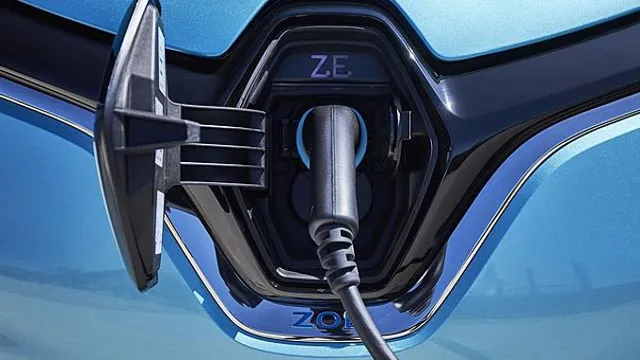
Explaining Battery Capacity Warranty
Electric car battery warranty is an important aspect to consider when purchasing an electric car. This type of warranty is a guarantee provided by the manufacturer that the battery will maintain a certain level of performance over a specified period of time. The warranty period can vary from manufacturer to manufacturer and can be anywhere from 5 to 10 years.
The capacity of the battery is measured in kilowatt-hours (kWh), and electric car battery warranties are typically offered in terms of kWh. For instance, a manufacturer may offer a warranty for 100,000 miles or 8 years, whichever comes first, with a battery guaranteeing at least 70% of its original capacity. This means that after 8 years, if the battery capacity drops below 70%, the manufacturer will replace the battery at no cost to the owner.
The capacity warranty is an assurance that the battery will maintain its performance and provide reliable long-term service to the owner.
Factors Affecting Battery Warranty
When it comes to buying an electric car, one of the most important factors to consider is the battery warranty. But what exactly affects the length and coverage of the warranty? One major factor is the battery’s chemistry and composition. Lithium-ion batteries, which are commonly used in electric cars, tend to have longer warranties than other types of batteries due to their durability and stable performance.
Additionally, the manufacturer’s reputation and track record can also impact the battery warranty. A company that has a history of producing high-quality batteries and providing reliable customer service is more likely to offer a comprehensive warranty that covers a range of issues. Finally, the warranty may also be affected by the owner’s usage habits.
Batteries that are subjected to extreme temperatures or charged improperly may experience degradation more quickly, which can impact warranty coverage. It’s important to carefully read and understand the terms and conditions of the battery warranty before making a purchase, as it can have a significant impact on the long-term maintenance costs of your electric vehicle.
Manufacturer’s Warranty Policy
When it comes to purchasing a new battery, it’s important to pay close attention to the manufacturer’s warranty policy. The warranty period can vary depending on a number of factors, including the type of battery, its capacity and voltage, and the typical usage conditions. Some manufacturers may offer a one-year warranty for basic batteries, while others may offer up to five years or more for more advanced models.
It’s also important to note that certain usage conditions may void the warranty, such as extreme temperatures or overcharging. By understanding these factors and taking proper care of your battery, you can ensure that it remains covered under warranty for as long as possible. So next time you’re in the market for a new battery, be sure to carefully review the manufacturer’s warranty policy to make an informed decision.
Environmental Factors Impacting Battery Performance
When it comes to batteries, warranty is an important consideration for consumers. However, environmental factors can play a major role in the performance and longevity of a battery, ultimately affecting its warranty. High temperatures can lead to increased chemical reactions within the battery, causing it to degrade more quickly.
On the other hand, extremely low temperatures can slow down the battery’s chemical reactions, resulting in reduced performance and potentially damaging the battery’s internal components. Additionally, exposure to moisture and humidity can cause corrosion and damage to the battery’s terminals and metal components. All of these factors can impact a battery’s performance and ultimately affect its warranty.
It’s important for consumers to consider their specific environmental conditions when choosing and using batteries to ensure optimal performance and preserve their warranty.
Driving Habits and Maintenance
One major factor that can affect the warranty of your car battery is your driving habits and maintenance routine. How you drive your car and take care of it can have a significant impact on the life of your battery. For instance, regularly exposing your battery to extreme temperatures, such as leaving it in a hot garage or parking it in direct sunlight for extended periods, can reduce its overall lifespan.
Additionally, frequently using accessories like your car radio or air conditioning system can drain your battery and shorten its lifespan. Maintaining the battery by regularly cleaning the connections and ensuring proper water levels can help extend its life. Ultimately, being mindful of how you drive and taking care of your battery can help you get the most out of your warranty and save you money in the long run.
Comparing Electric Car Battery Warranties
When considering purchasing an electric car, it’s important to also evaluate the battery warranty that comes with the vehicle. Different automakers offer varying lengths and terms for their battery warranties. For instance, Tesla offers an eight-year/unlimited-mileage warranty on their Model S and Model X batteries, while their Model 3 and Model Y batteries have an eight-year/120,000-mile limit.
The Nissan Leaf comes with a standard eight-year/100,000-mile battery warranty, while Chevrolet’s Bolt EV offers an eight-year/100,000-mile warranty as well. It’s important to note that some automakers also offer optional extended warranties for a fee, providing peace of mind for a longer period of time. Ultimately, choosing an electric car with a solid battery warranty can offer added protection and confidence for vehicle owners.
Leading Electric Car Brands and their Battery Warranties
When it comes to buying an electric car, the battery warranty is a significant factor to consider. The leading electric car brands offer different warranty periods for their batteries. Tesla, for instance, offers an eight-year/infinite mile warranty for its Model S, Model X, and Model Y batteries.
On the other hand, the Nissan Leaf comes with a five-year/60,000-mile battery warranty. Similarly, the Chevrolet Bolt EV has an eight-year/100,000-mile warranty for its batteries. It is essential to keep these warranties in mind, as it could save you thousands of dollars in case of battery failure.
However, it is also important to note that battery warranties do not cover all types of battery-related issues, and they have specific terms and conditions. Therefore, it’s essential to read the warranties’ fine print before purchasing an electric car to make an informed decision.
Cost of Battery Replacement after Warranty Expiration
When it comes to buying an electric car, it’s important to consider the warranty that comes with the battery. Most electric car manufacturers offer battery warranties ranging from 8 to 10 years, with some even offering unlimited miles in their warranties. However, what happens after the warranty expires? The cost of battery replacement can be hefty, ranging from $5,000 to $15,000 depending on the make and model of the car.
That’s why it’s important to compare electric car battery warranties carefully before making a purchase. It’s also important to keep in mind that the cost of battery replacement can vary widely depending on the age of the car and how well the battery has been maintained. That’s why it’s important to stay on top of battery maintenance, such as keeping it charged between 20% and 80% and avoiding extended periods of high heat or cold.
Ultimately, investing in a quality electric car battery with a solid warranty can save you money in the long run and give you peace of mind on the road.
Tips for Maintaining Electric Car Battery Health
When it comes to taking care of your electric car, the battery is a crucial part that requires attention. Not only does it affect the range and performance of your car, but it also has an impact on the battery warranty for electric cars. To maintain the battery health and ensure it lasts as long as possible, there are a few key tips to keep in mind.
Firstly, it’s important to avoid letting the battery get too hot or too cold, as extreme temperatures can damage it. Additionally, try not to let your battery sit at a low state of charge for too long, as this can also affect its health. Regularly charging the battery to around 80% and avoiding deep discharges can help prolong its life.
Finally, keep up with routine maintenance like tire rotations and brake checks, as these can impact the battery’s efficiency. By following these tips, you can help maintain your electric car’s battery health, ensure it performs at its best, and protect your battery warranty for electric cars.
Conclusion
In conclusion, the battery warranty for electric cars is like a marriage contract. You’re committing to a long-term relationship, expecting mutual trust, reliability, and support. Just like a spouse, your battery will be with you through thick and thin, powering your electric vehicle for years to come.
And if something goes wrong, your warranty serves as a prenup, protecting you and your battery from unwarranted harm. So, choose your car and battery wisely, and may your warranty be as strong and enduring as your love for electric driving.”
FAQs
What is the standard battery warranty for electric cars?
The standard battery warranty for electric cars is typically 8 years or 100,000 miles, whichever comes first.
Are there any warranties that cover battery degradation for electric cars?
Some manufacturers offer warranties that cover battery degradation, which means that if your electric car’s battery loses a certain amount of its original capacity within a specified time frame, the manufacturer will cover the cost of replacing the battery.
Can you buy an extended warranty for an electric car’s battery?
Yes, many manufacturers offer extended warranty options for electric car batteries, usually up to 10 years or 150,000 miles.
What is usually covered under an electric car battery warranty?
A battery warranty for electric cars typically covers defects in materials or workmanship that result in a battery failure or a significant loss of capacity. However, it’s important to read the fine print as some warranties may have exclusions or limitations.
